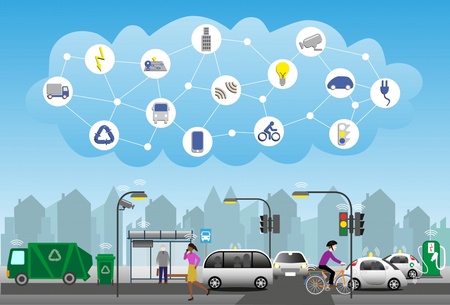An interactive tool developed through a partnership between the University of Aberdeen and the University of Lancaster is helping organisations, including local councils, to determine where and how best to use smart technology.
The tool, called Trustlens, can assist with decision making on the use of ‘smart’ street furniture like bins and lighting, in public places. It was devised as part of a wider project focusing on helping organisations to think through the ethical use and placement of Internet of Things (IoT) sensors in public spaces.
Examples of IoT sensors include smart street lights, which only turn on when they are needed, or a network of sensors providing data on air quality.
Funded by UK Research and Innovation via their PETRAS Cybersecurity Hub the tool, launched officially today, uses design methods to develop new policies for transparent and ethical use of secure IoT sensors.
Dr Milan Markovic, a Computing Science Research Fellow from the University of Aberdeen, said: “Transparency and privacy aspects of IoT technologies deployed in public spaces are often misunderstood by organisations. I am excited to see our early research prototype translated into a real-world tool that can help decision-makers to understand and consider these issues.”
Project leader Dr Naomi Jacobs, from the University of Lancaster’s ImaginationLancaster design laboratory, added: “As we see an increase in the number of sensors in our public places, it is vital that organisations in charge of implementing them consider the ethical issues they might pose.
“There are many questions that need to be considered in such deployments to make sure that the technology is being used to everyone’s benefit.
“Potential problems, such as privacy risks, must be understood and mitigated, and information should be available to those who might wish to understand the system, such as policy makers and members of the public.”
The Trustlens website provides free downloadable resources which prompt organisations designing, using or planning to deploy these technologies through a series of questions to guide scoping, development and operation. The website also offers examples to demonstrate the process.
Resources include guidelines for facilitators, interactive question packs in a range of formats, and downloadable question templates allowing organisations to develop their own bespoke questions.
Councillor Tim Hamilton-Cox, cabinet member with responsibility for sustainable economic prosperity at Lancaster City Council, said: “This excellent resource can be used by both councils and the businesses who supply devices and sensors. It will be an extremely useful tool because it will help ensure that data is collected openly and in a way that preserves the right to privacy that our residents expect.”


